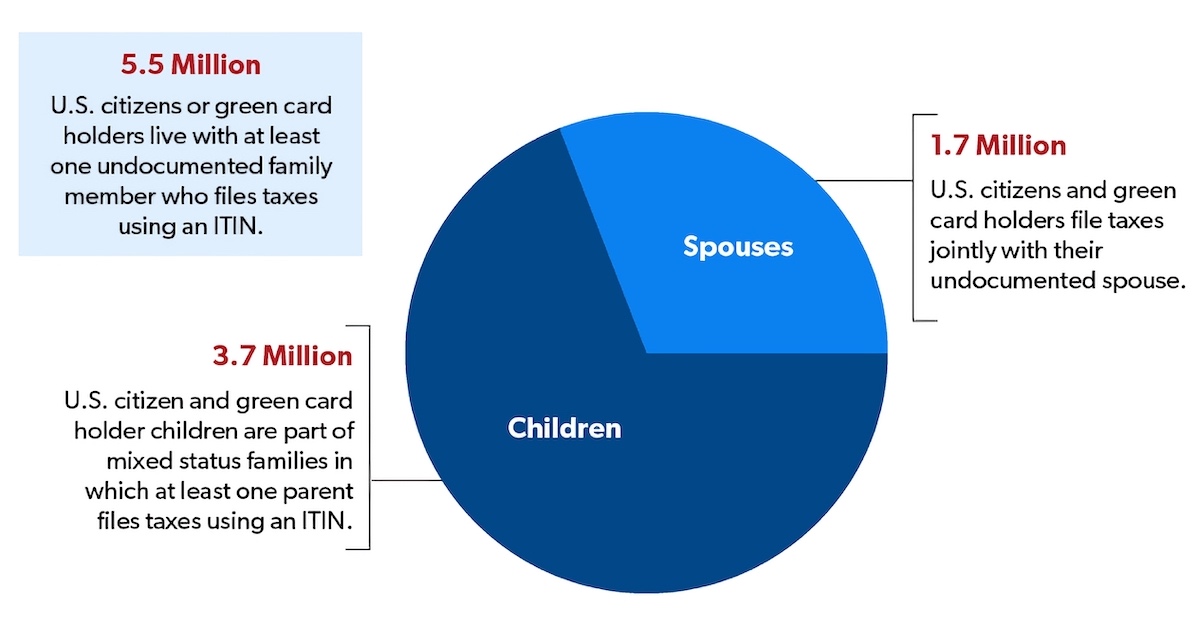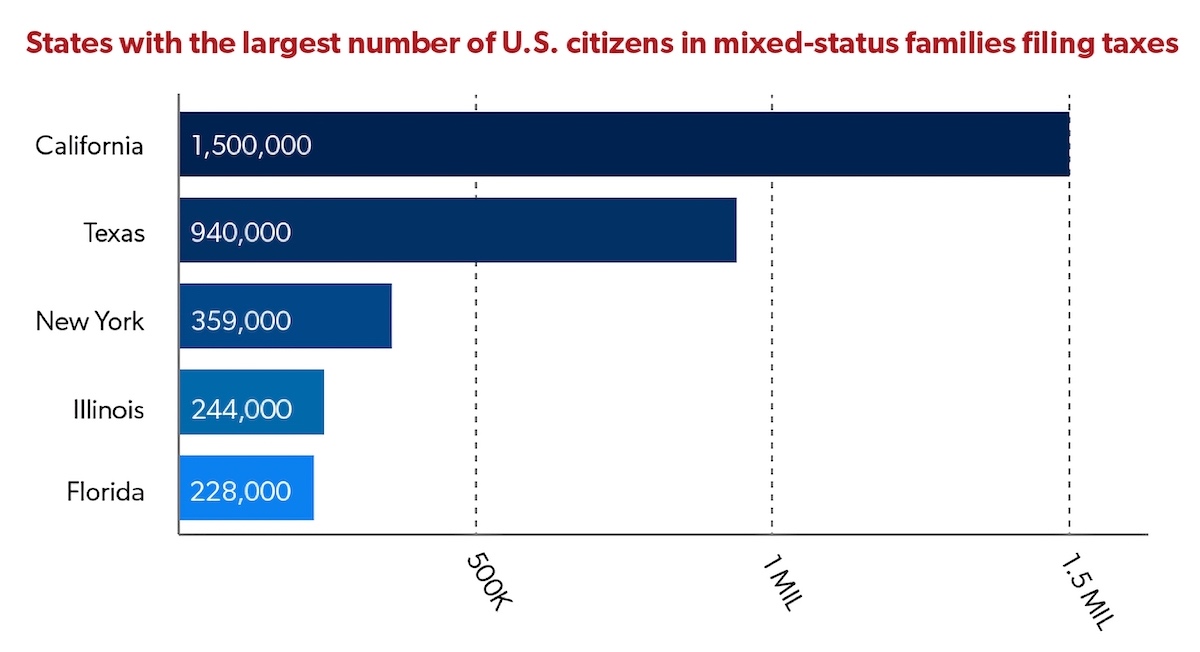Student Blog
Classes
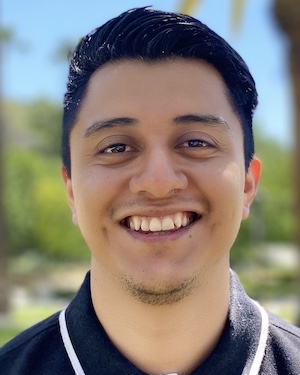
Mixed Status Families ⟩
March 29, 2021, by Daniel
Admissions Classes Diversity Fieldwork Life Hacks
According to the National Immigration Law Center, “a mixed-status family is a family whose members include people with different citizenship or immigration statuses. One example of a mixed-status family is one in which the parents are undocumented, and the children are U.S. born citizens”. The state of California has the largest number of U.S. citizens in mixed status families filing taxes, at 1.5 million people. This is a topic I would like to bring more attention to because many people may come from or know someone from a mixed status family, this includes students at USC and clients seen during fieldwork or residency, and this may not be something that is often brought up in the classroom. Personally, I live in a mixed status family, which includes DACA recipients and people without any documentation, with some extended family having other statuses as well.
Source: Migration Policy Institute, “Mixed-Status Families Ineligible for CARES Act Federal Pandemic Stimulus Checks” (May 2020), migrationpolicy.org/content/mixed-status-families-ineligible-pandemic-stimulus-checks
Source: Migration Policy Institute, “Vulnerable to COVID-19 and in Frontline Jobs, Immigrants Are Mostly Shut Out of U.S. Relief” (April 24, 2020) migrationpolicy.org/article/covid19-immigrants-shut-out-federal-relief
This past year has been really tough financially for my family and me. The multiple stimulus packages that were passed came with a lot of limitations for mixed status families. For example, as a USC student who is undocumented with DACA status, I was unable to apply to the CARES Act financial assistance for college students. After doing some research and waiting for the final relief bills to be amended and passed, I was fortunate to receive the stimulus check because I have a temporary work permit via DACA. However, not all undocumented students are DACA recipients, and many undocumented people did not qualify for anything, even though they pay taxes every year with an Individual Taxpayer Identification Number (ITIN) number. In the last year, I saw many people be excluded from federal assistance simply because of their immigration status, personally at home, with friends, and at residency. My parents and many of my clients in primary care were impacted by the exclusions in the COVID-19 relief bills, including the most recent under the Biden administration.
During this time, many families continue to rely on food banks, are behind on rent, and are surviving on the little help they can get. For example, I helped my parents and some of my clients apply to local and state specific relief programs which provided some financial assistance, but not nearly enough. And for many it’s not an easy process due to technology access, literacy levels, social support, etc. Last fall, I helped my parents write a letter and email it to a rent relief program that provided $500. I was appreciative that non-profit organizations and certain school departments took it upon themselves to be more inclusive and provide some type of financial assistance for students that may have not qualified for the CARES Act. As a current student, I was able to apply for the USC Ostrow Emergency Fund, the USC Graduate Student Government Emergency Assistance, and Immigranted (non-profit organization) for financial assistance to get through the year. Most of that assistance and my stimulus checks went to home expenses that my parents were simply unable to cover.
I believe this is an important discussion we need to have or at least consider in the academic setting and occupational therapy world. As I stated earlier, this impacts students at USC and in the OT programs, as well as clients being seen by occupational therapists/residents and/or fieldwork students. It’s important to consider how students may be navigating their own experience within a mixed-status family or perhaps have family/friends, clients, or colleagues that are experiencing this. As the Chan Division continues to push for more diversity and students from different backgrounds come in, it’s important to consider how prepared we are to support their education and clinical experience within the context discussed above.
No matter your political views, from an occupational therapy lens, we all have a responsibility to promote occupational engagement and occupational justice. This may include supporting clients navigating access to resources. As I found myself doing with my family and clients in primary care, I was that person that supported their own resource seeking as a means for survival during the pandemic. The reality is that not everyone has access to OT services or a family member who can help them seek resources. This is a very complex topic and there are many layers to it, perhaps many terms you may not be familiar with. I am always available for any questions (.(JavaScript must be enabled to view this email address)). I ask you to be open minded and encourage you to have these uncomfortable conversations. It is never too late to start learning and getting involved in the discussion. The COVID-19 pandemic revealed and exacerbated many of the disparities and social inequalities that have been there for many people in the United States, especially the undocumented population. I want to leave you with the questions below to reflect on:
- As a current or future occupational therapist, how are you going to support clients experiencing occupational injustices due to their immigration status?
- How are the needs of students within mixed-status families being met? How can we best support them in reaching their educational and professional goals?
References
Chishti, M., & Bolter, J. (2020, December 11). Vulnerable to COVID-19 and in Frontline Jobs, Immigrants Are Mostly Shut Out of U.S. Relief. Migrationpolicy.Org. https://migrationpolicy.org/article/covid19-immigrants-shut-out-federal-relief
Fact Sheet: Mixed Status Families and COVID-19 Economic Relief. (2020, August 13). National Immigration Forum. https://immigrationforum.org/article/mixed-status-families-and-covid-19-economic-relief
Mixed-Status Families Ineligible for CARES Act Federal Pandemic Stimulus Checks. (2020, December 9). Migrationpolicy.Org. https://migrationpolicy.org/content/mixed-status-families-ineligible-pandemic-stimulus-checks
The Affordable Care Act & Mixed-Status Families. (2017, October 20). National Immigration Law Center. https://nilc.org/issues/health-care/aca_mixedstatusfams
⋯
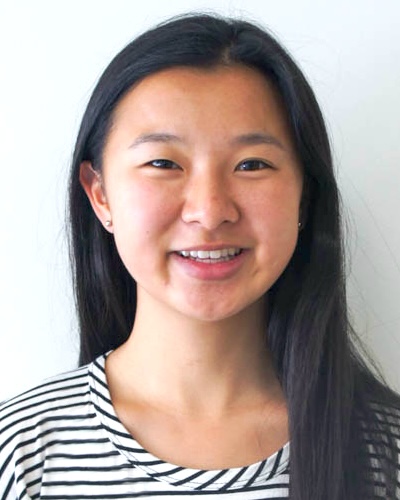
The A-Z’s of USC OT: Part II ⟩
March 22, 2021, by Bethany
Admissions Classes Living in LA What are OS/OT?
In a previous post, I began The A-Z’s of USC OT: Part I. So continuing right where we left off . . .
Occupation — Occupation is, of course, the focus of our profession and one of the focuses of our schooling. We do not compare ourselves to other professions, but rather learn how to advocate for the inherent value of our distinct perspective as OTs.
Program interconnectivity — As a BS-MA student, we get to meet a lot of OS minors through classes and the Pre-OT club. We join up with Entry-Level students for the graduate level curriculum. We get to learn alongside Post-Professional Master’s students and OTD students in our electives, and have PhD students as our TAs. From my experience, students get to interact with OTs in all programs.
Questions and answers — Questions about fieldwork? Scheduling? Applying to the OTD after finishing the Master’s? Clinical experience? Our faculty and staff (and student ambassadors!) are responsive to all of our queries. We are also paired with faculty mentors, who are matched based on our interests.
Rehab lab — In the Center for Health Professions, we have a lab for Adult Physical Rehabilitation that includes a hospital setting, a bedroom, bathroom, and fully-functional. We can practice creating and implementing interventions in a real space. You can check out the room on our virtual tour!
Shuttle — There is free transportation between campuses! The shuttle is accessible to everyone, not just students. And shuttle time is great for conversations, naps, or watching shows on your phone. One of the previous ambassadors, Noelle, recorded her shuttle trip.
Trojan Family — Whether it be cheering our team on to victory, ending up at a fieldwork site with USC alumni, or of course networking through the Trojan Network site, the Trojan Family is inclusive, extensive, and supportive.
Undergraduate Study — USC is one of the few schools to offer an undergraduate degree in Occupational Therapy, which helped me claim my identity as an occupational therapy student and learn to advocate better for the field. We also offer a minor in Occupational Science.
Vibrant student life — Around campus, you will find a bustle of students, whether they be grabbing food at the farmers market or Trader Joe’s or going to football games amidst a sea of cardinal and gold.
Well-established — USC’s OT program lives up to its name. We were the first Master’s degree in OT and the first PhD in OS. We developed Lifestyle Redesign, and we continue to be a top-ranked OT school.
X-amine yourself — Within our classes, we are given opportunities for introspection about how our own beliefs, communication styles, and backgrounds can affect how we come into a client-therapist relationship. For example, we complete a values checklist and share our results with our classmates, leading to (1) introspection, (2) learning to understand and listen to other perspectives, and (3) understanding the position of vulnerability we ask of our clients.
You’re not alone — Whenever I needed help, I had support from faculty. They worked with me to make sure I could participate in band for my senior year while taking classes. They looked at which fieldwork placements best suited my preferences and transportation needs. I’m happy to have resources to go to for anything I need in the program.
Zeal — One thing I have always admired about USC students is their passion. And now, I get to pursue my passion in occupational therapy alongside others who share that zeal to find ways to creatively help others do what they love.
Whew! 26 letters. Felt like a long list, but even so. It cannot sum up the passion for OT and the community that I found these past years. Regardless, I hope that I was able to give you a good glimpse into the program. 😊
⋯
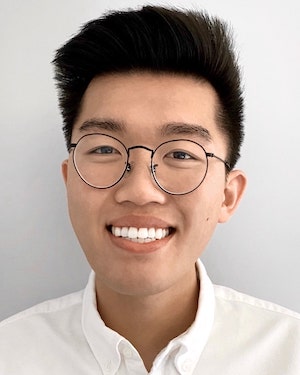
Restorative Occupation on R(OT)ation ⟩
March 15, 2021, by Calvin
Classes What are OS/OT?
Last week was the Week of Restorative Occupations! This eventful week encouraged all students, faculty and staff to engage in restorative occupations. There were daily division-hosted events not limited to baking sessions, cardboard loom-weaving, salsa dance breaks, and joke writing! There’s also a compiled list of General Resources that includes restorative occupations outside of USC that we can all continue participating in. Shoutout to our amazing Webmaster, Paul Bailey, because I’m sure he put in a lot of time and effort to put all of that together 😊! You rock, Paul!
Although the event itself is over, that doesn’t mean we should stop engaging in restorative occupations! This past week was a time to highlight and celebrate the importance of participating in those occupations, and I’m definitely going to keep mine going. One of my favorite occupations is listening to music, so I decided to create a Spotify playlist that really reflects what “restorative” means to me: good energy, happiness, and relaxation. I love to share what I listen to, so I’ll include a preview to my playlist below!
I was actually introduced to a few of these songs in my OT 578: Therapeutic Communication: Facilitating Change in Clients course because Dr. Jesús Díaz would invite students to play music during breaks. He even asked some faculty to send over their playlists — thanks for the new music Dr. Arameh Anvarizadeh and Dr. Sook-Lei Liew, we love good taste!
Feel free to comment down below if you discovered a new song you like or if you want to share some of your favorite songs!
⋯

The First Summer ⟩
March 12, 2021, by Lamoni
Admissions Classes
After acceptance letters went out, I have received lots and lots of questions about the first summer of the entry-level Master’s program. This is the time of a major transition — it may be your first time having a graduate school workload and you are wondering how to tackle it, perhaps you want to know if you can have a job during this period, or you are curious about how to maintain a social life. Before starting the program, I had these questions too. Now that I have completed that summer, I would like to talk about what it was like and answer some of those questions. Hopefully, this will ease some nerves! *note — this blog describes the layout of my summer but the program/your schedule may shift.
“How intense is the first summer?”
The initial summer is quite busy. I think it would be helpful to first explain what that summer looks like. For the first half of the summer, you will take Foundations: Kinesiology. This course reviews joint and muscle functions and teaches students how to apply biomechanical principles to everyday activities. For the second half of the summer, you will take Foundations: Neuroscience. Here, you will learn how to analyze daily living tasks through the lens of neural function. This course also reviews pathological conditions that interfere with performance. During the entire length of the summer, you will take Foundations: Occupation and Foundations: Creativity, Craft, and Activity Analysis. The Occupation course is an introduction to occupational therapy history and practice. During the Creativity course, you will have the opportunity to engage in craft projects, explore your creativity and analyze performance.
In total, you will be taking four courses in an 8 week timespan. Only three courses will happen at once due to Kinesiology and Neuroscience being split into first and second half. The class times are three hours long. Kinesiology and Neuroscience happens during the mornings while Occupation and Creativity takes place during the afternoons. In addition to the Kinesiology and Neuroscience lectures, there will be labs. This is where you will complete activities and worksheets as well as receive direct support from teaching assistants. This time is used to clear up any confusion you have about the material.
I explained the schedule to give a picture of what weeks will look like during the summer. As you can imagine, you will be frontloaded with a lot of information. These courses will serve as your foundation as you move through the program. Many classes will draw on the information that you learn here to introduce you to new and more in-depth concepts.
All in all, I would say that the initial summer is intense. Personally, I believe it is the busiest semester of the entire program. Not only are you learning a lot in your classes, you are navigating life as a graduate student which may come with new responsibilities, you are forming connections with professors, and you are creating new friendships. There are many things going on at once.
“Do you recommend working during this period?”
I chose not to work during my first summer. I made this decision because I did not want to overwhelm myself. I wanted to be sure that I had enough time to study AND rest. It helped me to review the material that we learned each day. I took an hour or two off once I got home to simply de-stress and relax. Then, I would review my notes. I know that I would feel exhausted if I did not take that time to rest and I would feel unprepared for the next class if I did not have the time to review my notes at the end of each day. I also needed my weekends to re-energize. Therefore, working was not feasible for me.
However, I would not say that it is impossible to work. My one piece of advice would be to limit your hours and, if you can, work some place that is flexible and might allow you to study.
“Am I expected to join student organizations during the summer semester?”
You are NOT expected to join any student organizations at this time. I received several emails from new students that were worried about how it would look if they were not “involved.” People typically begin to join student organizations during the Fall and I would say that most of my class did not join until the Spring. I did not know of anyone that was a part of a student organization during the summer. Maybe, the most that they did was get on the email list. Do not stress about this!
“Did you have time for a social life?”
This is probably the most common question that I received as it relates to the first summer. I would answer this by saying — You will have time for a social life if you make time for a social life. We often push leisure and pleasure off to the side and start to focus only on the work that we need to get done. That will easily set yourself up for burnout.
Did I take weekend trips out of state without ever looking at my notebook? No. But, did I have movie nights, go out for dinner, participate in game nights, and meet up with friends? Yes! It is so important to do this! You are human and you are not meant to work, work, work. Do not deprive yourself of simple pleasures. Even if you cannot take an entire day off to relax, fit it in at some point. You can set aside time to meet with your study group on Sunday morning and as a reward, you all can all head to the beach afterwards. You can study chapters 16-18 then go watch an episode of something with your roommate then return to chapter 19 when you are done. Do not feel guilty about taking a break. I promise that it is beneficial. Time to rest and/or socialize is productive too!
I hope that this blog post gave you a better idea of what the summer will look like and what you can expect. Yes, it is very busy. But, it doesn’t have to take over all facets of your life. There will still be time for play as long as you make it a priority (and you absolutely should)!
⋯

You Don’t Need to Be Perfect, You’re Still Learning ⟩
March 1, 2021, by Daniel
Admissions Classes Fieldwork Life Hacks
Over the last couple of weeks, I have been talking to students that find themselves at different points in their OT journey. This is a busy time as many wait for updates from admissions, some still deciding whether to pursue the OTD, and others wondering what field of OT to pursue as they find themselves in the final year of their program. Being able to connect with students from different backgrounds is my favorite part of this position and it is a privilege to learn all your stories. Around this time in 2018, I was waitlisted for the Entry-Level Master’s program, and to be honest I did not have high hopes that I would get in because of my GRE scores. At the same time, I was working a lot and still trying to finish my Bachelor’s degree while struggling to do well in Chemistry (I know, what a fun last semester!). When I have these conversations with students it takes me back to these days, the good and the bad times. This is a time in my life when I thought I had to be perfect in order to be successful. Whether you are waitlisted, deciding on an OT program, just discovering OT and not knowing if this is the right choice or feeling overwhelmed with the overload of information coming at you, remember that you are not perfect. None of us are.
Make sure you are taking the time to breathe and engage in things you love to do, even if it’s a few minutes of your day. Take those minutes to spend it with loved ones, call someone, and eat! Remember to practice what we preach and try to find a balance. You cannot control everything, so focus on the things you can and take care of yourself. We want you to be at your best during class, when studying, at fieldwork, and with clients. You should always strive to give it your best, but it’s okay to not be perfect. When you know you gave it your best despite the circumstances, I believe you can be at peace with the results. This way of thinking and restructuring my thoughts has helped me cope with the demands of grad school. Remember that part of learning is to fail and try it again. Dwelling on it will not change anything, but what you can do is learn from those shortcomings. Maybe you had a practical that didn’t go as planned, perhaps a rough fieldwork or residency day, you know, it happens! And often those are the times that stay with you the most, when you make a mistake, when you failed at something, or when you didn’t know what to do.
I recently read a quote from my assigned class reading about an immigrant woman that says, “I may not remember everything I have learned, but it has made me who I am today”. This is the quote I needed last week as I found myself struggling through my busy days. The long days and nights, assignment deadlines that feel impossible to meet, back-to-back meetings, the endless information introduced every week, etc. At times, it may feel like you’re just on autopilot, going through the motions. We can get so caught up in not knowing enough for an upcoming exam, for fieldwork, or for your residency setting. And of course, I do not know every single thing that was ever taught to me in school, but I have learned lessons from it all along the way. The Master’s program and now the OTD program, they have both challenged me in different ways. They have both made me question my abilities and have tested my motivation.
If you are reading this now and find yourself with doubts about what to do next, remember that you don’t need to be perfect. As you proceed to the next step in your journey, remind yourself that perfection is an unrealistic expectation that should not be put on anyone, you are a person and student that is still LEARNING. Take the necessary steps to learn from the particular experience you find yourself in, and with a little perseverance just keep going. Use the resources available to you, reach out for help, and don’t ever be afraid to ask questions. Lastly my virtual door is always open for those that may relate to this notion of perfection or if you have questions about OT and higher education (.(JavaScript must be enabled to view this email address)). I also invite you to make comments below if you would like 😊
⋯






